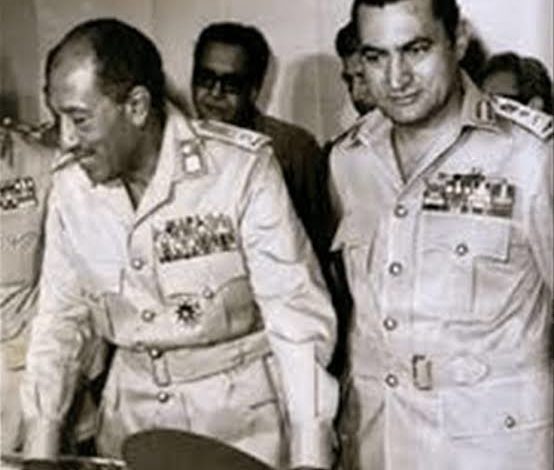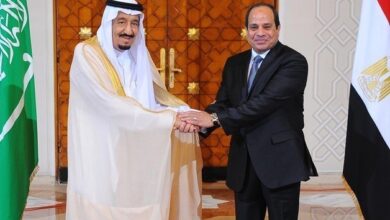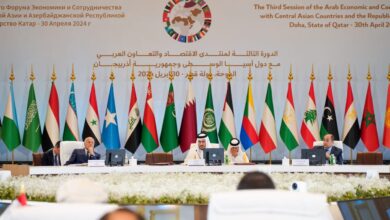
Egyptian Economist and International Youth Coach
Director of Asia Center for Studies and Translation
https://www.linkedin.com/in/ahmed-moustafa-27422814/
Asia Center for Studies and Translation – Directed by Ahmed Moustafa (wordpress.com)
Master Holder in Political Economy 2021, HSE Moscow
Member of CODESRIA, Dakar, Senegal, and Group of Strategic Vision
Russia and Islamic World, Journalists Against Extremism
Cellphone: +201009229411
Email: solimon2244@yahoo.com
ahmedmoustafa830@gmail.com
The memory of the October 1973 war victory against Israel remains a pivotal event in the history of the Arab world. It is crucial to delve into the intelligence and comprehension of this significant milestone and understand its regional and global implications. We will explore the background of the war, analyze the military strategies employed, discuss the aftermath of the conflict, reflect upon its impact on the Arab-Israeli competition, and evaluate the memory and legacy it has left behind.
The October 1973 war, also known as the Yom Kippur War or Ramadan War, erupted when Egypt and Syria launched a surprise attack on Israel on October 6th, 1973, coinciding with the Jewish holy day of Yom Kippur and the Muslim holy month of Ramadan. The intelligence of the Egyptian and Syrian forces was evident in their well-coordinated attack, catching Israel off guard. The war was a direct response to Israel’s occupation of Arab territories in the 1967 Six-Day War, primarily focusing on the Sinai Peninsula and the Golan Heights. The Egyptian and Syrian forces sought to regain control over these territories and alter the political dynamics in the region.
The military strategies played a crucial role in the outcome of the war. Egyptian President Anwar Sadat’s decision to cross the Suez Canal using a combination of surface-to-surface missiles, artillery, and infantry successfully flanked the Israeli Bar-Lev Line. This strategy aimed to bypass the formidable Israeli defense and achieve a breakthrough. Similarly, Syria focused on launching attacks against Israeli forces in the Golan Heights, intending to regain control of its occupied territories. The intelligence and comprehension of the Egyptian and Syrian commanders were evident in the initial success of their strategies, leading to territorial gains in the early stages of the war.
The October 1973 war significantly impacted the Arab-Israeli conflict and regional dynamics. Arab nations, particularly Egypt, realized the limits of military confrontation and the need for diplomatic negotiations. This war led to intense diplomatic efforts, eventually resulting in Sadat’s groundbreaking visit to Jerusalem in 1977 and the signing of the Camp David Accords in 1978. These diplomatic initiatives helped pave the way for peace between Egypt and Israel, with the return of the Sinai Peninsula to Egypt. Moreover, the war also highlighted the regional power dynamics and the role of external actors, notably the Soviet Union and the United States, in influencing the conflict.
The memory and legacy of the October 1973 war continue to resonate in the Arab world. While the conflict did result in a clear-cut military victory for the Arab side, it served as a turning point in the Arab-Israeli conflict. The war showcased the determination and resilience of Arab nations, particularly Egypt and Syria, in challenging Israeli military dominance. It also demonstrated the need for strategic thinking and effective military planning to confront well-established adversaries. The memory of this war remains a source of pride and motivation for Arab nations, allowing for a deeper understanding of the region’s history and the complexities of the Arab-Israeli conflict today.
What are the lessons gained from the October War of 1973 and the Defeat of Israel?
The October War of 1973 marked a significant turning point in the history of the Middle East, as it demonstrated the resilience and strategic prowess of Arab states against Israel. The defeat of Israel during this war taught valuable lessons to the international community, particularly highlighting the effectiveness of military planning, the importance of strategic alliances, the significance of intelligence gathering, the implications of psychological warfare, and the necessity of diplomatic negotiations. Analyzing these lessons provides a comprehensive understanding of the complexities and dynamics that shaped this conflict.
One crucial lesson derived from the October War was the power of effective military planning. Arab states, particularly Egypt and Syria, employed a well-coordinated and meticulously crafted military strategy that caught Israel off guard. The ability of Arab forces to execute surprise attacks on the Israeli Defense Forces (IDF) demonstrated the importance of meticulous planning, strategic deployment, and understanding the enemy’s vulnerabilities. The Arab states’ ability to quickly regain lost territories on the Sinai Peninsula and the Golan Heights highlighted the consequences of underestimating the capabilities and determination of their opponents.
Moreover, the October War emphasized the importance of strategic alliances in achieving military success. During the conflict, Arab states united in a common goal, setting aside their political and ideological differences. Egypt partnered with Syria, receiving military support from other Arab nations like Iraq and Jordan. The unity and collaboration among Arab states drove home the lesson that a united front greatly enhances the chances of victory. Conversely, the lack of coordination among Israel’s allies weakened their defense and made it substantially difficult to counter the Arab offensive.
Intelligence gathering played a pivotal role in the outcome of the October War. Arab states significantly improved their intelligence networks, obtaining crucial information about Israeli military plans, capabilities, and vulnerabilities. This knowledge allowed them to formulate effective strategies, select appropriate targets, and launch successful surprise attacks. In contrast, Israel’s intelligence failures left them ill-prepared for the Arab offensive, underscoring the importance of robust and accurate intelligence gathering to prevent strategic setbacks.
The October War also shed light on the implications of psychological warfare. Arab states skillfully employed psychological tactics to demoralize Israeli soldiers and create panic within Israeli society. This strategic use of propaganda, disinformation campaigns, and military broadcasts fueled a climate of fear and uncertainty, affecting Israel’s ability to effectively respond to the Arab offensive. The significance of psychological warfare as a tool to undermine an opponent’s morale and psychologically exhaust enemy forces became evident through the lessons of the October War.
Finally, the necessity of diplomatic negotiations became apparent following the October War. Although the Arab states achieved considerable military success, negotiations were indispensable to ensure a lasting peace. The conflict compelled both sides to recognize the need for diplomatic engagement, eventually leading to important peace agreements such as the Camp David Accords. The October War served as a powerful reminder that military victories alone do not guarantee long-term stability, but rather require diplomatic negotiations to solidify peace and prevent further conflict.
Similarities Between the October 1973 War and the Russian War in Ukraine
The October 1973 War, also known as the Yom Kippur War, and the ongoing Russian special operation in Ukraine share striking similarities despite occurring in different eras. It is crucial to analyze these parallels intellectually and comprehensively. Both episodes witnessed military war, regional proxy involvement, and geopolitical consequences. By examining these similarities, we can gain insights into the complexities of regional conflicts and better comprehend the dynamics of contemporary warfare.
Military War
Both the October 1973 War and the Russian war in Ukraine featured acts of military war. In the Yom Kippur War, Egypt and Syria launched a surprise attack on Israel, seeking to recover territories lost during the Six-Day War in 1967. Similarly, the Russian war in Ukraine began with Russia’s annexation of Crimea in 2014, followed by the support of separatist movements in eastern Ukraine to protect its borders from NATO invasion. These military wars in both cases were a kind of self-defense and protection of sovereignty.
Regional Proxy Involvement
The involvement of regional proxies further exemplifies the similarities between the two conflicts. In the October 1973 War, multiple Arab nations, including Egypt, Syria, Algeria, and Iraq, received support from other Arab states, such as Jordan, Saudi Arabia, and Libya. Similarly, in the Russian war in Ukraine, Russia has actively supported separatist movements, providing them with military equipment, training, and even soldiers. Moreover, the conflict attracted international attention, with countries like the United States, NATO, and the European Union providing support to Ukraine, while Russia found backing from certain countries, such as Belarus and Serbia. These proxy involvements demonstrate the broader geopolitical implications and potential for escalation in such conflicts.
Geopolitical Consequences
Both the October 1973 War and the Russian War in Ukraine have had significant geopolitical consequences. In the aftermath of the Yom Kippur War, regional alignments shifted as Egypt shifted from a Soviet ally to align closer with the United States. As it was one of the strategic mistakes. On the other hand, the Israeli-Egyptian Peace Treaty in 1979 paved the way for a more stable Middle East. Similarly, the Russian war in Ukraine led to a deterioration of Russia’s relations with the untrusted West, resulting in economic sanctions and diplomatic tensions. Also, the annexation of Crimea challenged the post-Cold War order and raised concerns about borders and territorial integrity across Europe and the emergence of a new world multipolar order. These geopolitical ramifications continue to impact regional dynamics and shape international relations.
The OPEC Alliance with Egypt in 1973 and Russia in 2022: A Formula for Success
The OPEC (Organization of the Petroleum Exporting Countries) alliance’s strategic collaborations have played a pivotal role in shaping global geopolitics and the energy landscape. Here we delve into the significance of two key alliances—between OPEC and Egypt in 1973, and OPEC and Russia in 2022—and explore how these collaborations contributed to their success. We will examine the multifaceted dynamics of these alliances and highlight the factors that fueled their triumph.
OPEC-Egypt Alliance in 1973
The OPEC-Egypt alliance in 1973 marked a significant turning point in global energy politics. Egypt, under President Anwar Sadat’s leadership, decided to form a united front with OPEC to challenge the dominance of Western oil-producing nations, primarily the United States. This alliance was based on the concept of using oil as a political and economic weapon, aiming to exert pressure on the state of Israel and its supporters. By implementing a targeted oil embargo against nations supporting Israel during the Yom Kippur War, OPEC and Egypt successfully increased oil prices and influenced global energy markets, showcasing their strategic mastery.
The Impact of the OPEC-Egypt Alliance
The OPEC-Egypt alliance in 1973 led to several substantial outcomes. First and foremost, it effectively highlighted the vulnerability of Western economies excessively dependent on oil imports. The subsequent oil shock experienced by these countries resulted in economic recession, high inflation, and an energy crisis, leading them to reassess their energy policies. Moreover, the alliance demonstrated OPEC’s collective bargaining power, establishing it as a major force in international politics. By smartly leveraging its oil-producing capabilities and forming strategic alliances, OPEC succeeded in reshaping the global energy landscape and defining itself as a powerful and influential entity.
The OPEC-Russia Alliance in 2022
Fast forward to 2022, and the OPEC-Russia alliance is yet again reshaping the global energy dynamics. This alliance, facilitated by widespread pressures amidst declining oil demand during the COVID-19 pandemic, underscores the significance of cooperative ventures in an increasingly interconnected world. Russia, a non-OPEC oil-producing nation, joined forces with OPEC to stabilize oil prices and regain market control. This symbiotic partnership benefits both parties, as Russia gains influence within the organization while OPEC secures greater stability in global oil markets.
The Significance of the OPEC-Russia Alliance
The OPEC-Russia alliance’s achievements in 2022 are multifaceted. Firstly, it showcases the adaptability and responsiveness of OPEC, specifically in recognizing the need for non-traditional partnerships to mitigate the challenges posed by global economic uncertainties. Furthermore, the alliance strengthens the organization’s negotiating position by incorporating the world’s largest oil-producing nation. Through this collaboration, OPEC and Russia can strategically manage supply levels, influence oil prices, and consequently protect their economic interests. This synergy illustrates that alliances remain a powerful tool in an ever-changing global energy landscape.
Western Media misleads the global audience about Egypt’s victory in the 1973 war and demonizes Russia
In October of 1973, the Egyptian military, supported by a faithful citizenry, was able to bring an end to the Yom Kippur War after a decisive victory against Israel. Since then, many media outlets have circulated a narrative of skewed facts and misinformation that severely downplays the accomplishments of Egyptian leadership in the conflict. we will examine this narrative and explore why this narrative of misinformation has been pushed by Western media outlets, as well as to understand the effects of this misinformation on the legacy of Egypt’s victory.
Misinformation
A common attitude towards the Yom Kippur War is one of ambiguity and confusion, which ultimately reflects the ways in which Western media have presented the conflict to the public. Contrary to the truth, Western media outlets often describe the Yom Kippur War as a failed attempt by Egypt to gain control of the Sinai Peninsula. In the same vein, there is a common understanding that the Yom Kippur War only lasted two weeks, instead of the nine-week struggle that it really was, an untrue assumption that fails to acknowledge the months of sacrifice and hard work that went into Egypt’s victory.
In addition, Egyptian military leaders’ success in the war is rarely examined; instead, the decisions of the Israeli military leadership are hailed as the primary factor in ending the war. This further undermines the legitimacy of the Egyptian victory by implying that the victory came about purely due to Israeli decision-making, and not because of the courage and skill of the Egyptian military forces.
The Source of the Misinformation
It is difficult to determine the precise source of this misleading narrative. However, some have suggested that it could be partly due to a Western bias that portrays the idea of Israel being able to defend against superior forces as impressive instead of noting the even more spectacular feat of Egypt when it comes to the Yom Kippur War. It could also be that the misinformation comes from Israel, as well as their allies in the West, who have a vested interest in downplaying any perceived victories for the Arab nations.
The Impact of the Misinformation
Regardless of the source, the consequence of such misinformation is that it has negated the efforts and successes of the Egyptian military in the Yom Kippur War. This has had the effect of instilling the idea that the Arab nations, especially Egypt, are not capable of competing with the Israeli military forces. It also perpetuates the notion that the Arab nations are not capable of exercising their own sovereignty and self-determination.
Demonizing Russia
The consistent messages of the Western media are that Russia is a dangerous, untrustworthy nation with a hostile foreign policy and a vendetta towards the West. This is a narrative that is often repeated and the West offers no alternate viewpoint or context. This narrative is taken to the extreme, often suggesting that Russia is a dangerous nation, hell-bent on global domination, and not to be trusted under any circumstances. This is despite the fact that Russia has repeatedly tried to open diplomatic channels with the West and has maintained mutually beneficial trade agreements and partnerships.
The Western media’s narrative of Russia often ignores the fact that it has been a victim of Western aggression in the past. The NATO bombing campaign on Yugoslavia in the 1990s is a prime example of this, where NATO forces bombed Serbia (a province of Yugoslavia that is now recognized as an independent nation) in order to push for the cessation of ethnic cleansing. Despite the fact that NATO’s actions may have been in the name of a greater good, the Western media has failed to acknowledge the impact that it had on Russia. As a result of this aggressive action, mistrust towards the West was planted deep in the Russian consciousness, one that has been reinforced by Western media since then.
Furthermore, Western media rarely acknowledge the threats that NATO poses to Russia. This includes NATO’s expansion, which has seen the organization grow exponentially in size since the fall of the Soviet Union. This expansion has placed a number of NATO states on Russia’s borders and it has also seen NATO forces move ever closer to Moscow, creating a zone of potential engagement that could result in armed conflict. Again, this issue is given little to no coverage in the Western media and the narrative remains that NATO is a peaceful organization while Russia is a hostile one.
The Divide between Egypt and Russia has Perished global stability since the 1970s
The 1970s witnessed a crucial shift in global politics as the once-thriving bipolar world of the Cold War gradually deteriorated. In this context, the relationship between Egypt and Russia assumed particular significance, marking a turning point in the international power dynamics. This essay aims to examine the divide that emerged between Egypt and Russia during this period, and how it contributed to the erosion of bipolarity. Through an analysis of the historical events and geopolitical considerations, this essay presents an in-depth exploration of the complexities that led to the divergent paths of these two nations.
Historical Context
The shift in Egypt’s alignment away from the Soviet Union can be traced back to the historical events of the 1970s. After President Gamal Abdel Nasser’s death, his successor President Anwar Sadat sought to break free from the confines of the Cold War blocs. Sadat’s bold diplomatic move was epitomized by his visit to the United States in 1974, effectively signaling a willingness to explore new alliances and partnerships. This deviation from the Soviet Union’s sphere of influence significantly impacted international bipolarity by undermining the dominance of the U.S.-USSR rivalry.
Geopolitical Considerations
The geopolitical landscape played a crucial role in driving the divide between Egypt and Russia. Sadat’s recognition of the strategic importance of the Middle East intensified his focus on Egypt’s national interests, which he believed would best be served by forging closer ties with the Western powers. Furthermore, the escalating Arab-Israeli conflict and continuous U.S. involvement in the region pushed Egypt away from the Soviet orbit. Realizing the need for military assistance and economic aid, Sadat looked beyond the conventional Soviet backing, envisioning a more diversified network of international partnerships.
Breach in Ideological Alignment
The ideological differences between Egypt and Russia also contributed to the disintegration of bipolarity. As Egypt embraced a policy of economic liberalization and openness to the West, the Marxist-Leninist ideology propagated by the Soviet Union increasingly diverged from Sadat’s domestic and foreign policies. The Soviet Union’s unwavering support for the Arab socialist movement and its condemnation of Sadat’s economic reforms further strained their relations. This ideological gap widened over time, punctuating the decline of bipolarity and the rise of multipolar dynamics in international politics.
The Impact on Bipolarity
The divide between Egypt and Russia significantly influenced the bipolar world order of the 1970s. Sadat’s realignment away from the Soviet Union provided an impetus for other non-aligned countries to re-evaluate their alliances, thereby reducing the influence of both superpowers. Moreover, Egypt’s gradual integration into the Western camp signaled the emergence of new global power dynamics, with regional alliances superseding bipolar rivalry. This breach between Egypt and Russia was a critical factor in the disintegration of bipolarity, setting the stage for the complex multipolar world that followed.
In conclusion, The October 1973 war victory against Israel is a pivotal event that demonstrates the intelligence and comprehension of a Graduate School student. Its background, military strategies, aftermath, and impact on the Arab-Israeli conflict are significant lessons that continue to resonate today. The war’s outcome was shaped by effective military planning, strategic alliances, intelligence gathering, psychological warfare, and diplomatic negotiations. These lessons remind the international community of the complexities of armed conflicts and the importance of comprehensive decision-making.
The similarities between the October 1973 War and the Russian war in Ukraine are evident at an intellectual and comprehensive level. Both conflicts witnessed military war, regional proxy involvement, and geopolitical consequences. Analyzing these similarities provides insights into contemporary warfare dynamics, regional stability challenges, and potential impacts on international relations.
The OPEC alliance with Egypt in 1973 and Russia in 2022 has reshaped the international energy sector through strategic maneuvering. These alliances have secured long-term success, established collective bargaining power, and ensured market stability. The divide between Egypt and Russia in the 1970s marked a significant moment in the erosion of bipolarity during the Cold War.





